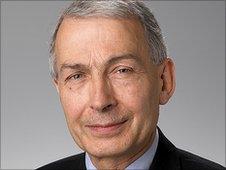Poverty tsar Frank Field looks at child benefit cuts
- Published

Mr Field said he was getting full co-operation from the government
Taxing child benefit or stopping it at 13 are among the options being looked at by "poverty tsar" Frank Field.
The Labour MP, asked by David Cameron to conduct an independent review into tackling poverty, told the Times no ideas should be "off the table".
Rather than means-testing child benefit as some have suggested to save money, he said it could be "age related".
But his Labour colleague David Miliband said targets for ending child poverty must not be "betrayed".
Mr Field stressed that his work was in its very early stages and he had yet to draw any conclusions.
He was sacked as Labour's welfare reform minister in 1998 after falling out with colleagues over radical plans to reform the system and has since been a persistent critics of Labour's policies.
He is now leading an independent review on the government's poverty reduction strategy - including the £11bn annual outlay on child benefit - and said the prime minister was "100% behind" his work.
Age-related
He said there was a clear case for more financial support in the first three years of a child's life to help mothers stay at home but the fact the burden on mothers tended to reduce when their children get older should also be considered.
At the moment, parents are paid £20.30 a week for the eldest child and £13.40 for subsequent children, payments continuing until 19. Benefits for 16-19 year olds are conditional on them being in full-time education.
"In the last few days there has been a lot in the press about whether we should means-test child benefits," he said.
"What I would like to introduce is another way of looking at this - age relating it."
Mr Field said saying many mothers were "more engaged" with their work when their children reached 13 or 14 and the system could reflect that.
"They feel more secure with their children when they are over 13 and so on. If you have a crisis at work and can't be home, it is not such a disaster as when you have a seven-year old coming home from school."
If payments were stopped at 13, the government would save £3bn but families with two children would be £10,000 worse off over a six-year period.
Home environment
The Conservatives ruled out means-testing child benefit before the election but in a report published on Friday, the Social Market Foundation think tank said withdrawing child benefit from higher income-earners could save billions of pounds.
Mr Field said he was against means-testing but given the government's determination to sharply reduce borrowing, there were other options worth considering.
Taxing child benefits "certainly ought to be one of the options", he said. "I don't think any options should be off the table."
Mr Field said he had already held meetings with senior Cabinet ministers on the review's remit.
One of the areas to be looked at is how a child's home environment affects their life chances and progress at school and Mr Field said there must be greater recognition of how much poor parenting skills could hinder development.
Mr Field has suggested the current measure of child poverty - defined as 60% of median earnings - should be rethought to incorporate such non-monetary factors.
Poverty calculations
But shadow foreign secretary and Labour leadership contender David Miliband condemned the idea.
"The 60% target is not just something Labour thought up, it is the internationally recognised measure of poverty," he said.
"Of course poverty is about more than just money - but it is about money as well."
He expressed concerns such an approach could ultimately lead to Labour's target on eradicating child poverty by 2020 - something the coalition government has said it wants to keep - being abandoned.
"I want Frank, as a Labour MP, to stand up for Labour's vision of a Britain where none of our children grow up poor. For the Tories to drop the ambition to ensure that no child grows up poor would be a betrayal."
Children's charity Barnardo's warned that any reform of child benefit should ensure that the incomes of poorest families were protected.
A spokeswoman said: "We would be concerned if child benefit was stopped for older children. Nearly four million children, after housing costs, are living in poverty in the UK today.
"Taxing child benefit and ensuring that any surplus is redistributed to the children and families most in need would unarguably be a step in the right direction."
- Published5 June 2010